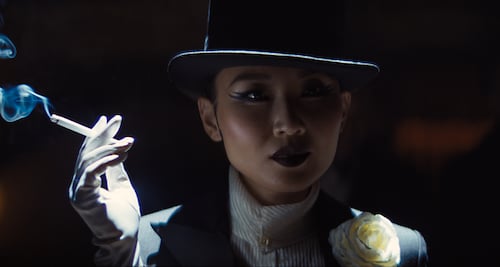
New drama Babylon blows the lid off 1920s Hollywood, depicting Tinseltown as a den of iniquity, bad behaviour and rampant drug-taking. With an all-star cast led by Brad Pitt and Margot Robbie, it's a party you don't want to miss, marshaled by the Oscar-winning director of Whiplash and La La Land, Damien Chazelle.
Babylon is steeped in the early history of the movie industry. The film occupies the all-important transition between silent cinema and sound pictures, which threatens to leave existing players out in the cold even as a new generation adapts to a bold new way of working.
Want to find out more about the real-life Hollywood figures who influenced Babylon's bacchanalian ensemble? You've come to the right place. Scroll down to find out more.
1. John Gilbert
Influence on Jack Conrad (played by Brad Pitt)
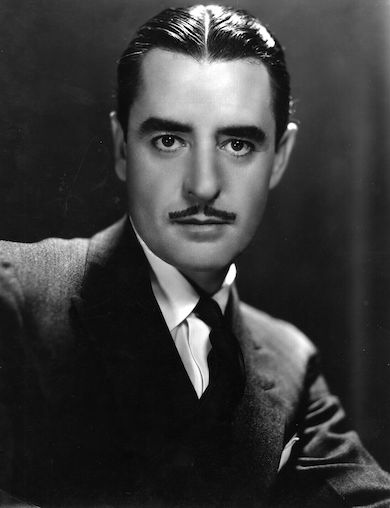
Amidst Babyon's sprawling canvas, suave Jack Conrad's star shines the brightest, at least initially. He's the veteran star of more than 100 silent pictures (not to mention multiple marriages) and he's helped popularise the status of the actor. As he explains, "When I first arrived in Hollywood, it said no actors or dogs allowed. I changed all that."
Talking of change, silent cinema is about to go the way of the dodo with the onset of talking pictures. In Babylon, the arrival of Al Jolson's revolutionary The Jazz Singer in 1927 prompts a sea-change in the way that movie executives and Hollywood perceive movies, and Jack's somewhat stiff acting style is starkly exposed in this new era. He then wonders if he has any future left in the industry he helped propagate.
Conrad is said to have been based on actor, screenwriter and director John Gilbert. Renowned as 'The Great Lover' during his heyday in the silent era, Gilbert (born John Cecil Pringle) was a hugely popular leading man, having worked his way up from the position of a background extra.
His first leading role was in Princess of the Dark (1917) in which he played a hunchback in love with a blind girl. Taken under the auspices of Triangle Studios and, eventually, Fox Film Corporation, with whom he had a three-movie contract, Gilbert swiftly ascended the greasy pole.
Gilbert later got himself released from Fox and pitched up at MGM where he made some of his most celebrated movies including The Merry Widow (1925). The film was overseen by executive Irving Thalberg (played in Babylon by Max Minghella) and directed by the noted silent director Erich von Stroheim.
However, this came at the expense of his personal relationships: he was married four times and was notoriously a bigamist. He had affairs with the likes of Greta Garbo and eventually found himself shunted to one side when studios began to favour sound cinema following the release of The Jazz Singer.
2. Clara Bow
Influence on Nellie LaRoy (played by Margot Robbie)
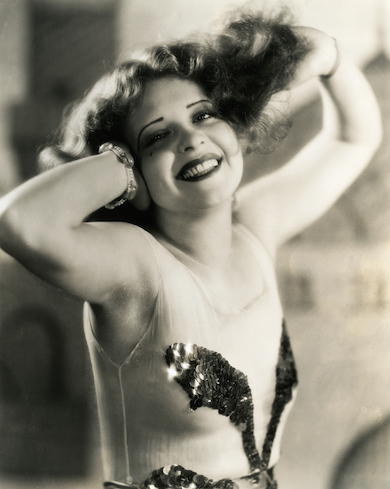
Wild child Nellie LaRoy gatecrashes the Hollywood scene and despite having no experience in moviemaking, proclaims herself to be a star. When she lands a plum role in a silent movie, she impresses the filmmakers by being able to cry on cue.
That said, when Nellie is later forced to adapt to the needs of talking pictures, her lack of experience and failure to hit her marks for the purposes of microphone recording is agonisingly exposed, leading to a nail-biting sequence that is as tense as it is hilarious. (Imagine a more mean-spirited variation on the classic scene from Singin' in the Rain.)
Robbie's impressively full-throttle performance conveys the essence of an ambitious young woman from the wrong side of the tracks who is determined to do things her way.
However, Nellie's drug habits and escalating gambling debts cause both her life and her career to take tragic turns. An attempt to rehabilitate her image at a posh party hosted by media magnate William Randolph Hearst results in a spectacularly vomitous meltdown that precipitates Nellie's fall from grace.
Nellie's character is, by Robbie's own admission, heavily influenced by silent cinema 'it girl' Clara Bow. Brooklyn-born Clara had a tragic upbringing: her mother tried to kill her while the former was shooting her first movie Beyond the Rainbow (from which Clara was ultimately cut).
Clara's Hollywood stardom was secured by her groundbreaking role in IT (hence 'it girl). In the movie, she plays a salesgirl who has a crush on the upper-class manager of the department store where she works. The movie was loosely based on a two-part serial in Cosmopolitan by gossip columnist Elinor Glyn, who wrote that “It” was “That quality possessed by some which draws all others with its magnetic force."
Infamous as an early Hollywood 'flapper' (defined as a young woman who flouts social mores and conventions), Bow was renowned for her scandalous, no-holds-barred personal life. Among other things, she was reported to have had an affair with John Wayne. And that detail about Nellie crying on cue? That's ripped directly from Clara Bow's own life.
3. Louis Armstrong
Influence on Sidney Palmer (played by Jovan Adepo)
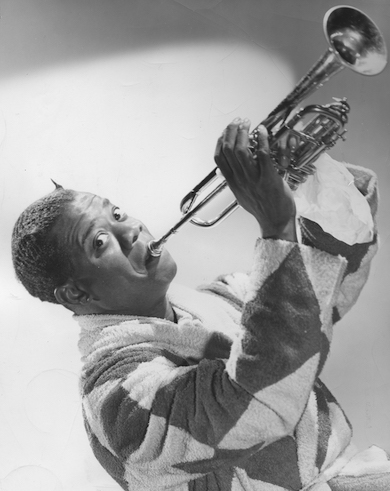
Jazz trumpeter Sidney Palmer harbours ambitions that the prejudices and conventions of early Hollywood simply won't allow for. He's introduced during Babylon's orgiastic opening party sequence, blasting away on the trumpet with his band as the assorted revellers get up to all kinds of bad behaviour. (Composer Justin Hurwitz's raucous jazz piece 'Voodoo Mama' is performed diegetically in the context of the sequence by Sidney himself.)
The remainder of Babylon traces Sidney's destiny as he breaks from his musical ensemble and is lured by the promise of more power and wealth. He's granted his own Hollywood mansion but during a shocking sequence later on, he's told to 'black up' to mitigate the studio light that's falling on his face. It's more than enough to instill a sense of disillusion and despair and Sidney finds himself lamenting the path of his career along with Babylon's other characters.
Sidney is a composite of several jazz artists from the 1920s. One of the most significant is the groundbreaking Louis Armstrong who is credited with popularising the medium of jazz in early 20th-century America.
Armstrong has gone down in history as one of the most revered and celebrated performers of all time, and he eventually bowed out with his performance of 'We Have All the Time in the World' from 1969's James Bond movie On Her Majesty's Secret Service.
4. Louella Parsons
Influence on Elinor St. John (played by Jean Smart)
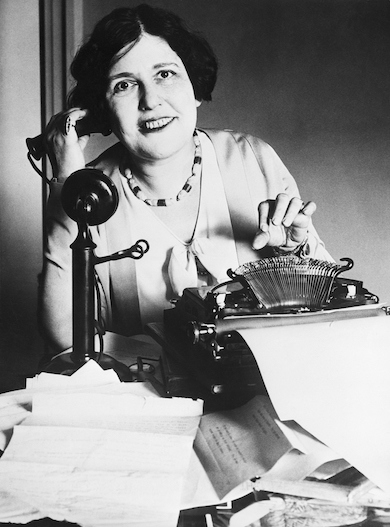
The ins and outs, rises and falls of Babylon are studiously recorded by feared gossip columnist Elinor St. John. She's played by the noted scene-stealer Jean Smart (Mare of Easttown) and she has the capacity to make or break careers with her penetrating journalism.
In fact, Elinor, being on the outside, is likely the only person to see things as they truly are. When Jack confronts her about an apparently insulting cover story that questions the future of his career, she calmly shoots him down by claiming, "It's bigger than you." In other words, while Jack's screen career is temporary and ephemeral, his legacy and impact on the world of movies are secured forever.
Elinor is another composite character who has been stitched together from the remnants of many famous Hollywood rag writers. In addition to the aforementioned Elinor Glyn, the character is also influenced by Louella Parsons, a columnist and screenwriter. Parsons found favour with the powerful William Randolph Hearst when she favoured the latter's mistress Marion Davies (who turns up during Nellie's explosive party meltdown).
With Hearst's backing, Parsons found her way into the dark heart of Hollywood and all too gleefully exposed its tantalising secrets and scandals. She exposed the divorce between Douglas Fairbanks Sr. and his wife Mary Pickford, a power couple and two of the players who had helped establish the studio United Artists. And she's said to have held Clark Gable's wife hostage in order to secure the scoop on the woman's imminent divorce from the Hollywood legend.
Eventually, Parsons' authority gave way to the likes of Hedda Hopper. The latter, an aspiring actress turned writer, was initially granted copy under Louella's byline but soon grew in stature herself. Amidst their high-profile battles, the two women publicly clashed over William Randolph Hearst's depiction in Orson Welles's path-breaking Citizen Kane, and Ingrid Bergman's pregnancy.
5. Anna May Wong
Influence on Lady Fay (played by Li Jun Li)
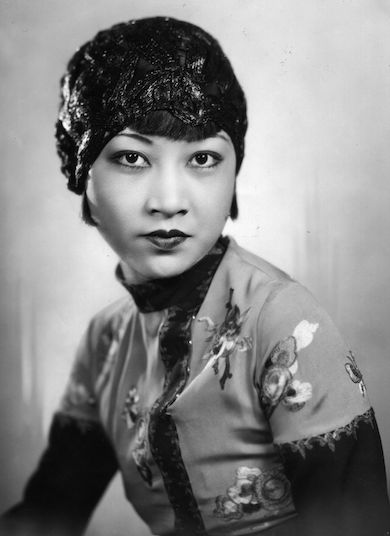
Lady Fay is one of Babylon's most memorable characters. By night, she's a sultry and provocative cabaret singer who revels in sexually explicit lyrics that get the Hollywood party animals going. By day, she's an intertitle writer for silent movies. When Lady Fay expresses an attraction for Nellie LaRoy (whom she saves from a rattlesnake bite), it has wide-ranging and tragic consequences that play out in all the Hollywood scandal rags.
Li Jun Li's portrayal of Lady Fay is said to be based on Anna May Wong. Considered to be the first Chinese-American star in Hollywood, Wong enjoyed a fruitful career across multiple platforms including screen, radio and television. Renowned for her style and career-defining roles in the likes of The Thief of Baghdad (1924), in which she starred with Douglas Fairbanks, Wong struggled throughout her career with rampant Hollywood stereotyping.
Many facets of Wong's life are reflected via the character of Lady Fay in Babylon. Eventually, Wong left America altogether and took up a successful stage and screen career in Europe. It's been reported, although not consistently corroborated, that Wong was ostracised by the newly-implemented Hollywood Hays Code censorship rules that outlawed interracial romance on-screen. This is despite the fact that censorship dealt specifically with characters of black and white ethnicity, rather than those of Chinese extraction.
Regardless, Wong lost out on a coveted role in MGM's The Good Earth (1935), although she continued acting in various capacities both during and after World War II.
6. René Cardona
Influence on Manny Torres (played by Diego Calva)
The idealistic and aspirational Manny is our audience surrogate as the events of Babylon play out. Manny is the quintessential outsider: a Mexican immigrant compelled to make his own way amidst the madness and excess of nascent Hollywood. However, he's able to make more than a few valuable connections, starting with Jack Conrad, and Manny then starts to make his way up the ladder, beginning as a studio assistant and eventually moving upwards to become a studio executive.
The one constant in Manny's life is Nellie LaRoy for whom he pines throughout. Eventually, Manny and Nellie's destinies crash together in shocking and unexpected ways, which brings the sprawling narrative of Babylon to its conclusion.
Manny is another composite figure and there are several touchstones with regard to immigrant workers in mid-twenties Tinseltown. One of the key influences is René Cardona, a Cuban-born, American-raised man who befriended silent film icon Rodolfo Valentino. This proved to be the making of Cardona who began as an extra before making Hollywood's first credited Spanish-language picture Sombras Habaneras in 1929.
Cardona undertook many different roles in the movie industry. As well as director, he also served as lighting technician, first assistant director and technical advisor. Upon moving to Mexico, Cardona eventually made more than 100 films and became the country's biggest star of the time, his career ranging from the 1930s to the 1980s.
Are you ready to join the wildest party of the year? Click here to book your tickets for Babylon, releasing at Cineworld on January 20.
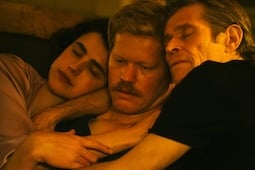
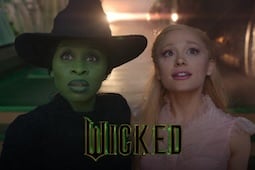




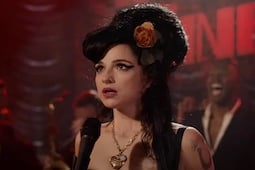






.jpg)
.png)



